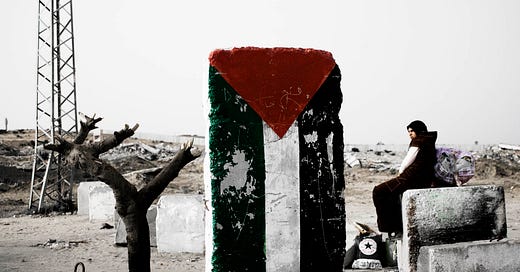The hostage negotiations grind on. In the latest update, CIA deputy director Danny Cohen said last night that a deal “largely depends” on Hamas. The obstacles are several and detailed, but in essence they call to mind Golda Meir’s famous 1973 remark: “They say we must be dead. And we say we want to be alive. Between life and death, I don’t know of a compromise.” Ironically, this now neatly summarises the position of Hamas. While Benjamin Netanyahu is determined to kill Yahya Sinwar and his cronies, Hamas is only looking to survive.
But among all the demands that go back and forth – the IDF must withdraw from the Philadelphi corridor along the Egyptian border, Gazans must be allowed to return to the north without being screened, and so on – it is very revealing to note the category of demand that is nowhere to be found. Namely, demands for territory.
The reason for this is simple. There is no sensible territorial dispute at the heart of the Gaza war. In 2005, Israel withdrew unilaterally from the Strip, handing the keys to the Palestinians. That opportunity to create a thriving enclave on the Mediterranean was squandered when power was seized by Hamas, who drove Gaza into the position of destruction in which it finds itself today. That was not about territory. It was about jihadism.
Glance at the three main fronts currently facing Israel – the war in Gaza, the conflict in the north with Hezbollah and the existential struggle with Iran – and they are all characterised by this one feature. Five years before Israel pulled out of Gaza, it withdrew from Lebanon, likewise resolving any territorial dispute. Just as in the south it was rewarded by the rise of Hamas, the territory to the north has become the happy hunting ground of Hezbollah, the Shia militia that was spawned by Iran for the same purpose. As for Iran, it lies more than 1,200 miles distant from the Jewish state.
Yet despite this obvious fact, speak to almost anybody in the West, including –or perhaps especially – our political leaders, and it will be clear that they view two-state solution as the magic bullet that will bring peace to the Middle East. Partly, this is because there are no reasonable alternatives for the West Bank that preserve both Israel’s Jewish and democratic qualities. This is understandable. The lack of other options, however, doesn’t make the proposal you have any more realistic, and basing a strategy on fantasy is bound to fail.
It is a well-worn truism to suggest that if Israel laid down its arms, there would be a genocide, whereas if the Arabs did the same, there would be peace. But truisms are so called for a reason; the truth embedded within this this one reveals the naïveté involved in blindly pushing the two-state solution without addressing the radicalism that drives the Palestinian cause. As far back as 1947, when the Palestinians rejected a two-state solution for the very first time and the world gave birth to Israel anyway, the Arab world immediately attacked. Was that about land? It was not.
As hostilities broke out, Amin al-Husseini, the Palestinian leader who had introduced Nazi propaganda into the Middle East during the war, made bloodcurdling demands for murder on the wireless. The conflict that followed was “a war of self-defence against a ruthless, pro-Nazi, and openly genocidal Palestinian leadership that enjoyed enormous popularity among the Arab and Palestinian masses”, the historian Joseph Spoerl observed. Plus ça change; the Oslo Accords of the Nineties, which were designed to lead to a Palestinian state existing in peace alongside Israel, were sabotaged by the frenzy of suicide bombing that constituted the Second Intifada. All of this – and much more – reveals the depravity of October 7 as simply a more extreme expression of the Palestinian jihadism that has long been the main obstacle to peace.
That’s not to say that all Palestinians are radicals. But a moderate minority, or even a moderate but toothless majority, will do nothing to protect Israel from destruction. Over the last 76 years, the Palestinians have been in the grip of leaders who are authoritarian, corrupt, fanatical and violent, sometimes all at once, while across the Arab world, not a single meaningful democracy can be found. Is it realistic to expect that after an Israeli withdrawal, a Palestinian state would magically become the first?
Imagine that Israel had unilaterally pulled back not just from Lebanon and Gaza, but from all contested territory, including the West Bank and Golan Heights, as was Ariel Sharon’s intention before a coma stopped him. To suggest that peace would have resulted would be fantasy indeed.
Take, for instance, the Iranian regime, which is behind almost all the militancy against Israel in the region. In its mind, the Jewish state is the “little Satan”, while the “great Satan” is the United States. Would it let hostilities rest if Israel elected to shrink itself to what the Israeli statesman Abba Ebban described as the “Auschwitz borders”? Or would the regime be emboldened? For Israel, such a gamble would be an existential one, and the odds would not be good.
Without Israeli military infrastructure in the West Bank, for example, there would be no counter-terror presence to prevent Hamas and its fellow travellers from mushrooming there. Given the group’s level of support on the Palestinian street, it would very likely have been only a matter of time – and a short amount of time at that – before Jerusalem faced an Iranian-supported Hamastan on its eastern border as well as on that to the west. Imagine an October 7 on both fronts. It does not bear thinking about.
Would the international community support an Israeli invasion when the terror threat became intolerable? Or would they accuse the Jewish state of “genocide”? When Sharon withdrew from Gaza in 2005, part of his thinking was to demonstrate to the world that Israel had done all that what was demanded of it, in the hope that Jerusalem would be supported in any subsequent hostilities. Looking back, this looks unbearably naïve.
Between Gaza and the West Bank lies the Israeli heartland known as the “Hadera-Gadera rectangle”, an area just nine miles wide and 60 miles long, which contains half the country’s population and much of its vital infrastructure, including Tel Aviv. On October 7, Hamas advanced several miles into Israeli territory. Reduce the country’s resource-heavy jugular to just nine miles and place Hamas on both sides, and in a further attack it could be snipped in two, a military tactician’s worst nightmare.
Moreover, running along the centre of the West Bank is a spine of high ground, offering a powerful tactical advantage. I have stood atop one of these hills and looked through a telescope into apartments in Tel Aviv. The right kind of munition fired from that point, or from innumerable other locations across the territory, could skim below the altitude at which the Iron Dome defence system is effective, claiming the lives of many innocents.
A similar situation can be found in the north, where the Golan Heights have proven a huge tactical advantage to invading armies from Syria and Lebanon in past conflicts, particularly the Yom Kippur war of 1973. Israel avoided destruction on that occasion partly because Syrian troops inexplicably halted their advance from the higher ground, giving Israeli forces space to beat them back. Would it really be wise to hand the high ground to President Assad?
If the conflict is not about land, what is it about? It is not an “Israeli-Arab” dispute, as the foremost enemy of the Jewish state is the Islamic Republic of Iran, which is not an Arab country. Nor is it a straightforward Jewish-Muslim conflict. Many citizens of Israel are Muslim, including Qaid Farhan Alkadi, the Bedouin Israeli hostage who was rescued from Gaza this week, and there are Muslim Israelis serving in the IDF. Moreover, several Muslim countries, such as the United Arab Emirates, have signed peace accords with Jerusalem.
No. The territorial wrangles on the West Bank are significant, but fundamentally, this conflict is about backward jihadi fanaticism that views a Jewish state in the Middle East as a source of Muslim shame. It is an attitude of honour killing writ large. No two-state solution, therefore, can succeed without a programme of deradicalisation, together with an answer to the perennial problem of woeful Palestinian leadership. The sooner the world drops its illusions about this, the sooner we will find our way to peace.






In large measure, hatred of Israel is derivative of Hatred of the Jews. Yeah, Israel has killed some people in Gaza, but Americans killed hundreds of thousands of people in Vietnam, Laos and Cambodia which were 10,000 miles from California. By contast, Gaza is adjacent to Israel. Gazan goons killed 1200 Jews on October 7. The West bank is 9 miles from he Med Sea. But how many air heads in the MSNBC crowd are familiar with maps.
I delinieated 9 discrete causes of anti Semitism. Most of the causes you have heard before. Some of my ideas are, I think, novel
https://davidgottfried.substack.com/p/nine-camouflaged-causes-of-anti-semitism
Of course it is about land and I say this as a complete non-expert. The Gaza strip is a refugee enclave into which the dispossessed natives were pushed when European jews seized their homelands. Now, sir, was this an injustice or was it not? I guess they want their land back. That would be easy to understand, without any need to postulate backward jihadi fanaticism etc etc.